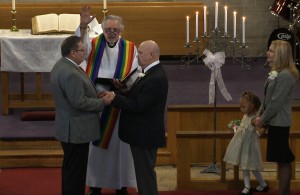KQED 9 will broadcast A Church Divided on Friday, Feb 15, at 7:30 p.m. The television documentary will take viewers to the United Methodist Church’s convention in Tampa, FL, where delegates from around the world gathered to decide the future of the church and its official policy on gays and lesbians. Below, show host and longtime Prop 8 reporter Scott Shafer writes on the topic of religion's role in LGBT rights issues.
Religious beliefs, scripture and traditions are overtly at the heart of the United Methodist Church's divisions over same-sex marriage. They're also present, in somewhat subtler ways, in the legal conflicts over California's Proposition 8 and the federal Defense of Marriage Act (DOMA). Both are now before the U.S. Supreme Court and will be heard next month, and both will ultimately be resolved within the evolving legal views on homosexuality of federal courts.

From the perspective of proponents of Proposition 8, the federal district court case in 2010, in which California's same-sex marriage ban was ruled unconstitutional, was more about putting religion on trial than it was about LGBT rights. Attorneys challenging the measure showed video tapes of one proponent (Hak-Shing William Tam) testifying during pre-trial discovery that Prop. 8 "will cause states one-by-one to fall into Satan's hands."
Judge Vaughn Walker ultimately ruled that Prop. 8 violated the 14th Amendment's guarantees of due process and equal protection under the law, and that the state has no rational basis for preventing same-sex couples from marrying.
"Moral disapproval alone is an improper basis on which to deny rights to gay men and lesbians," he wrote. "The evidence shows conclusively that Proposition 8 enacts, without reason, a private moral view that same-sex couples are inferior to opposite-sex couples."